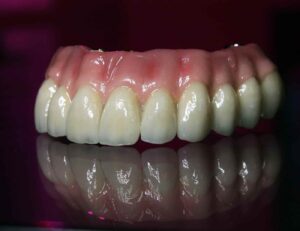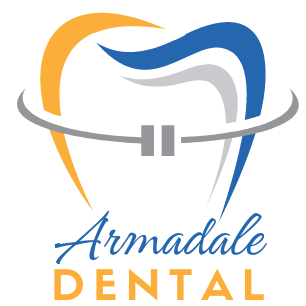What Are Denture Implants? A Comprehensive Guide to Implant-Supported Dentures
Denture implants represent a remarkable leap forward in dental care, providing a stable and comfortable alternative for individuals with tooth loss compared to conventional dentures. This comprehensive guide aims to shed light on denture implants, offering insights into their role, benefits, and considerations for those contemplating dental restoration.

Understanding Denture Implants
Denture implants are specialized dental devices meticulously crafted to replace missing teeth. Unlike traditional dentures resting on the gums, denture implants anchor directly into the jawbone, delivering a secure and natural feel.
This dual-functionality of denture implants not only restores comfortable chewing and speaking but also significantly enhances the aesthetic appeal of one’s smile. This innovative solution stands as a testament to the amalgamation of technology and practicality in modern dental care.
Denture Implants vs. Traditional Implants: Unveiling the Differences
While both denture implants and traditional dental implants share the common goal of replacing missing teeth, they diverge in their design and application. Denture implants typically support full or partial dentures, providing stability for larger prosthetics. On the other hand, traditional dental implants are employed for individual tooth replacement, often supporting crowns or bridges.
- Denture Implants
- Support: Full or partial dentures
- Application: Ideal for extensive tooth loss
- Attachment: Allows for removable dentures
- Number of Implants: Fewer implants can support a full set of dentures
- Stability: Provides stability for a larger area, suitable for complete arches
- Traditional Implants
- Support: Individual crowns or bridges
- Application: Used for single or multiple tooth replacements
- Attachment: Permanently fixed to the jawbone
- Number of Implants: Generally, one implant per tooth
- Stability: Targeted stability for individual teeth
Types of Denture Implants
Denture implants come in various types, catering to specific needs and preferences. The common variants include implant-retained dentures, bar-retained dentures, and the innovative All-on-4 or All-on-6 dentures. Each type boasts unique features, offering distinct advantages.
- Implant-retained Dentures: Balances stability and removability, connected to dental implants via ball or stud attachments.
- Bar-retained Dentures: Involves a metal bar connecting to multiple implants, offering stability through a secure snap-on denture.
- All-on-4/All-on-6 Dentures: Utilizes four or six implants to support a full arch of teeth, providing a fixed, comprehensive solution.
The choice among these types depends on individual dental conditions, preferences, and budget considerations.
Benefits of Denture Implants
The advantages of denture implants are multifold, significantly enhancing the quality of life for those grappling with missing teeth. Here are some notable benefits:
- Enhanced Stability and Functionality: Denture implants provide a secure fit, reducing the discomfort and slippage associated with traditional dentures. This stability, in turn, improves chewing and speaking functionalities.
- Improved Oral Health and Bone Preservation: By preventing bone loss, denture implants play a crucial role in maintaining oral health. Unlike traditional dentures, they do not exert pressure on adjacent natural teeth.
- Aesthetics and Confidence Boost: Designed to mimic natural teeth, implant-supported dentures enhance facial appearance, boosting the patient’s self-esteem and confidence.
The Denture Implant Procedure
The journey towards denture implants involves a series of meticulous steps, ensuring a patient-specific and detailed process:
- Initial Consultation and Treatment Planning: A comprehensive oral examination determines the patient’s suitability for denture implants, considering factors like oral health and bone density.
- Implant Placement Surgery: Under local anesthesia and sometimes sedation, implants are surgically placed based on the chosen type of denture implant.
- Osseointegration: The critical phase where the bone integrates with the implants, forming a sturdy base for the dentures. The duration can vary based on individual circumstances.
- Denture Fabrication and Attachment: Custom dentures are created and securely attached to the implants, ensuring a natural look and feel.
Each stage of the denture implant procedure emphasizes precision and care, promising the best possible outcome for the patient.
Caring for Denture Implants
The longevity and effectiveness of denture implants hinge on proper care. A consistent hygiene routine is imperative, involving regular brushing of the implants and surrounding tissues, using recommended cleaning solutions, and, if removable, soaking the dentures. To ensure optimal care:
- Proper Hygiene Routine: A daily cleaning routine, including brushing the dentures and cleaning the gums and implant sites, prevents infection.
- Regular Dental Visits: Routine check-ups monitor the implants and dentures, ensuring they remain in good condition and function properly.
- Adjustments and Repairs: Denture implants may require adjustments or repairs over time. Seeking professional help for discomfort or issues is crucial to prevent more serious complications.
Who is a Good Candidate for Denture Implants?
An ideal candidate for denture implants typically includes individuals with one or more missing teeth due to decay, injury, or gum disease. Key factors determining suitability encompass general health, sufficient bone density to support the implants, and good oral hygiene practices.
While certain chronic conditions or habits like smoking may impact the success of the implant procedure, a thorough evaluation by a dentist is essential to ensure denture implants are a safe and effective choice. Young individuals with developing jawbones or those undergoing specific treatments may need to explore alternative options.
Why Choose Armadale Dental Dentistry for Your Denture Implants?
Armadale Dental Implant Center distinguishes itself through its expertise in implant dentistry. Employing advanced technology and a personalized treatment approach, the center ensures each patient receives care tailored to their needs.
The team of expert dental professionals at Armadale Dental specializes in denture implants, prioritizing quality and precision in every procedure. Commitment extends to patient comfort, safety, and satisfaction, making Armadale Dental Implant Center a trusted choice for reliable and effective denture implant solutions in Ontario.
For those considering denture implants, scheduling a no-cost consultation with Armadale Dental Implant Center can provide personalized guidance towards regaining confidence and enjoying the full benefits of implant-supported dentures.
Frequently Asked Questions
- How long do implant dentures last?
- With proper care, implant dentures can last from 15 to 20 years or more. Regular dental check-ups and good oral hygiene are crucial for their longevity.
- What is the difference between permanent dentures and implants?
- Permanent dentures are fixed to the jawbone, offering a non-removable and stable solution. Dental implants, on the other hand, are titanium posts inserted into the jawbone, serving as a foundation for replacement teeth.
- Which dental implant is best?
- The “best” dental implant depends on individual needs, including oral health, the number of missing teeth, and bone density. Consulting with a dental expert is crucial to determine the most suitable type.
In conclusion, denture implants stand as a revolutionary solution for those seeking reliable, stable, and aesthetically pleasing tooth replacement. By understanding the nuances of the procedure, benefits, and aftercare, individuals can make informed decisions about embracing the transformative impact of denture implants on their dental health and overall well-being.
